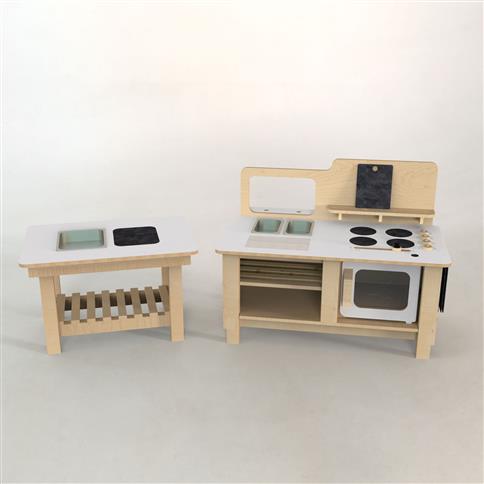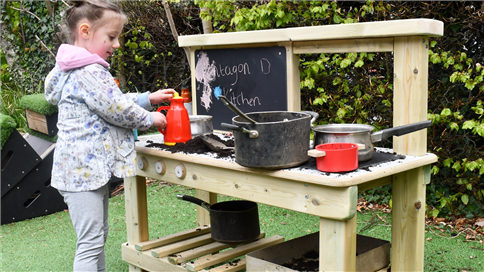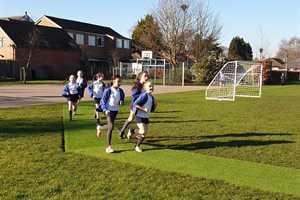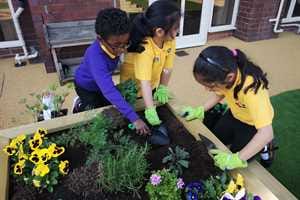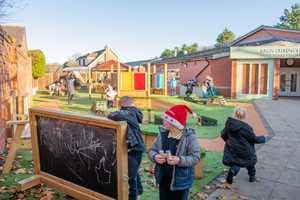
Outdoor Learning and Play
How to Encourage Outdoor Role Play for EYFS pupils
Play can be defined as “freely chosen, personally directed, intrinsically motivate behaviour that actively engages the child” National Playing Fields Association (NPFA).
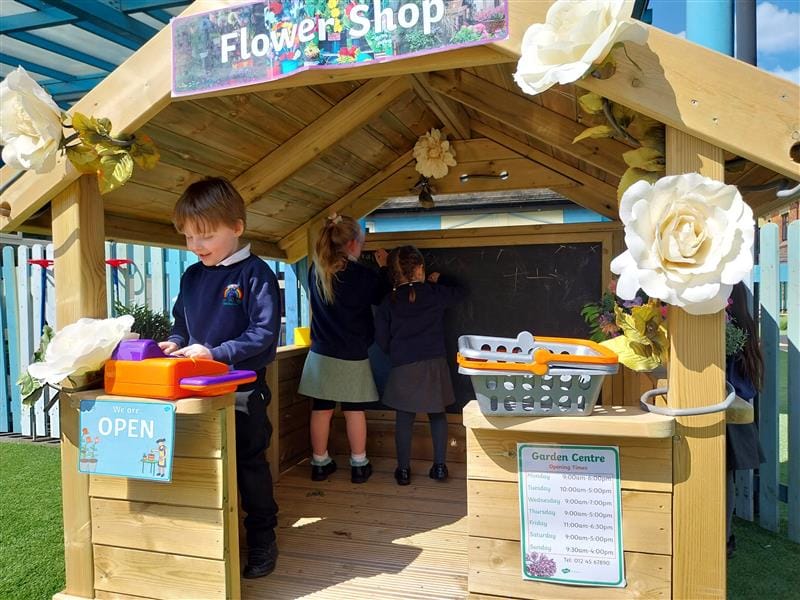
Play is a fun way for children to learn about themselves, other people, and the environment around them; whilst at the same time developing important skills that help their cognitive and physical development through Role-Play.
Throughout the world proclaimed early educators have seen the value that Play provides children over hundreds of years, from Froebel (1826), Montessori (1916) to Piaget (1945), and holds a revered position by many early years educators and philosophers such as Cannella (2002) and Gadamer (2003).
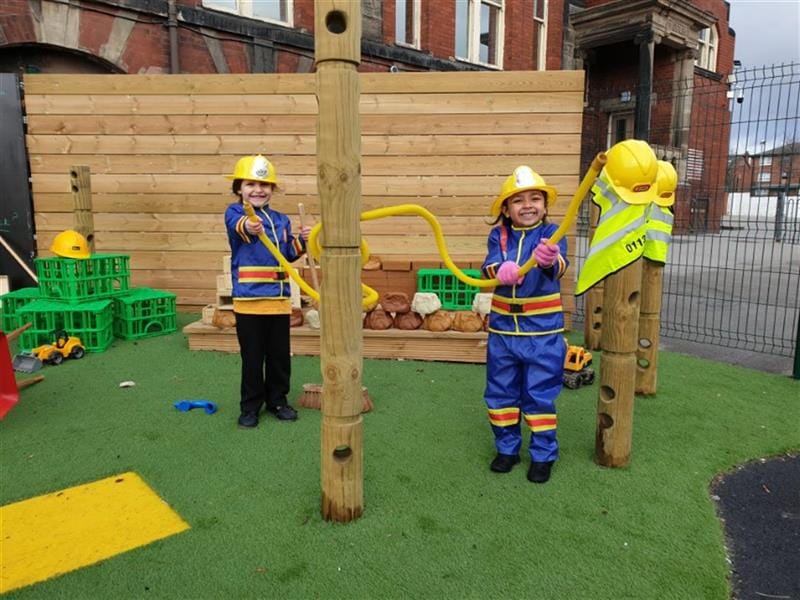
EYFS Outdoor and Classroom Role-Play plays a critical part in a children’s creative development as stated in the Early Years Foundation Stage (EYFS) at school.
By allowing purposeful play, children are encouraged to develop their emotional awareness, social skills, and manage events and emotions in a safe setting.
Children’s Role-Play also highlights that everyone has their own take on events and situations and that everyone is unique from having different personalities, and family heritage, to where they live.
Role-Play is also inclusive, allowing children with special needs to have fun with other kids. With outdoor play being important for children with special needs, role-play is a great solution.
EFYS Role-Play activities encourages children to develop their linguistic skills, manage their emotions, promotes creativity, co operation through learning, and boosts social and cognitive skills in a safe space.
Why is Children's Role Play Important?
For children, Role-Play and imaginative play is a natural thing to do, and you will often see them playing individually or with other children and “pretending” to be in a different environment such as a doctor’s surgery, post office, travel agent's, knights and princesses, or an event that happened to the children at home.
By providing continuous provision and allowing children to Roleplay different situations, children can develop critical skills needed such as:
- Creativity skills
- Communication skills
- Language skills
- Social skills
- Emotional skills
- Problem-solving skills
- Teamwork skills
Role-Play through continuous provision encourages children to explore new and old ideas about the world around them in a safe environment.
.jpg)
What Does the EYFS Framework Say About Role Play?
The EYFS framework emphasizes the importance of Role Play in early childhood education. It sees Role Play as an extremely powerful tool which supports learning across all parts of the curriculum. Role Play activities are supported by senior leadership and teachers and are implemented into daily learning activities.
Role Play activities are effective in developing prime areas of learning, such as:
Communication and Language:
Through Role Play, children can enhance their communication skills by engaging in dialogue and storytelling within their imaginative scenarios.
Expressive Arts and Design:
Role Play promotes creativity and allows children to express themselves artistically, whether they are reenacting real life scenarios or inventing new ones.
Literacy:
By adding elements of reading and writing into children's play, they can develop their literacy skills and understanding of the world, in a context that is meaningful and enjoyable the them.
Outdoor Role Play Ideas for EYFS Environments
Outdoor Role Play Ideas for EYFS Environments
When setting up an outdoor Role-Play area you must remember to set the children up for success and have open ended resources!
For EYFS Role-Play to run smoothly and for the children to gain as much as possible from their time Roleplaying, the Role-Play area and children need to have:
Knowledge of key vocabulary that is needed:
Before letting the children go off and Role-Play, early years teachers must discuss what words and terminology the children might use in certain scenarios developing language skills. This enhances children’s confidence when Roleplaying and will ultimately make it more fun for the children.
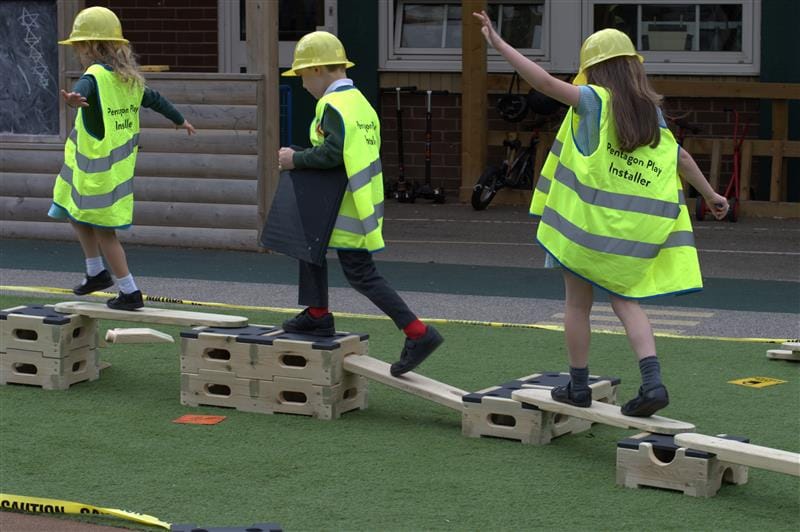
Real objects and props to bring the Role-Play Areas to life:
Using real life objects and props will bring Role-Play Areas to life for the children. For example, having a till, food, and recipe books for a café or shop with coins, notes, and bank cards or even a telephone for a Vets surgery helps the children get into the role and become that real life character!
If props aren’t available why not get the children creating them and encouraging children's interests relating them to real life?!
An understanding of the scenario and script:
A great way to introduce the Role-Play topic and enable the children to understand the scenario in more depth before going to do it is to discuss the real life scenario with the children before they go off and play, this helping their communication and language skills.
For example, tell the children that the Role-Play will take place at a real life train station. Then encourage ask them to explain the different things that they need to do to get on a train… what would they do in real life?
Go to the ticket office, buy a ticket (one way or a round trip, economy or business class!), walk to the correct platform (explain what one is), read the train timetable, buy a drink or sandwich, get on the train, where will they sit (on the aisle or by the window?), what will they do on the train? is there a ticket master? who’s going to drive the train? is there food on the train? Create a real life situations for the children to Role-Play.
.jpg)
An environment to allow imagination and fun to flow!
An important factor for every Role-Play area is that it must promote imagination and fun! Role-Play areas are there for children to let their creative juices flow in a safe and open environment.
Create scenarios where at the children can create imaginative, humorous, silly, or serious scenarios where they can work individually and in groups to set a particular scene or character.
.jpg)
Encourage creativity and imagination:
Let children create their own scenarios and characters. By allowing them to do so, teachers and adults will promote creativity and help children express their understanding of the world around them.
Imaginative play supports development within children, so it's important to try and get kids utilising their imagination and harnessing the benefits from it.
The Overall Benefits of Outdoor Role Play:
Outdoor Role Play in school is vital in helping develop motor skills (fine and gross), reduces stress, increases concentration, and promotes self-esteem and self-confidence as well as helping children form good relationships with their peers.
Role-play Idea For EYFS
Try carrying out this fantastic role play activity with your EYFS class and watch them emerce themselves in a new world, whilst developing a variety of different skills!
By creating a unique and engaging role play scenario, you'll find it easier to encourage children to pretend play.
Busy Little Bakers:
A lovely Role-Play area that fits in nicely with the topic Changes within Living Memory – Food and Sweet Treats, is a Bakery.
Within this topic, children will be learning about food and how it has changed over the past 100 years. Looking closely at how people’s tastes have changed over the years, how food availability has improved, and why. In this instance looking at sweet treats and how they have changed over the years.
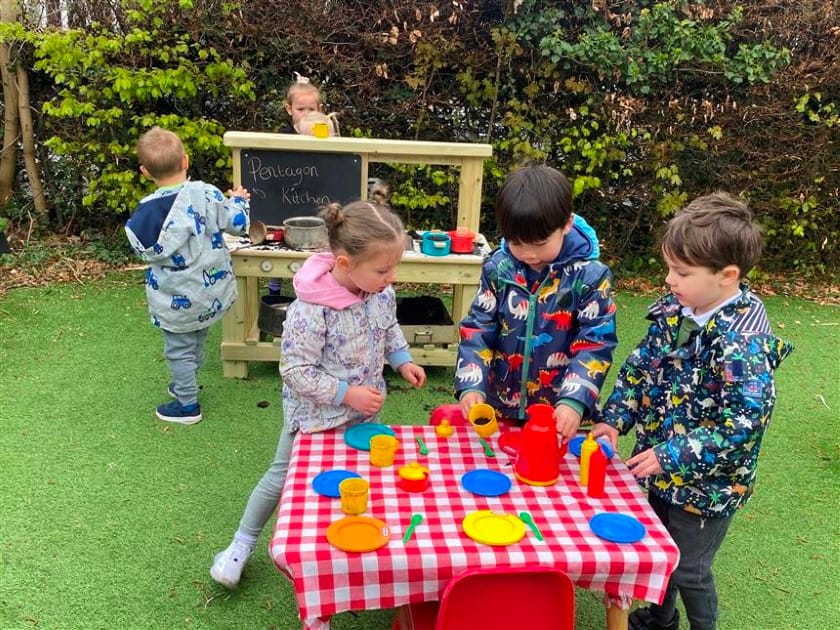
Ask the children what sweet treats they eat at home: sweeties, biscuits, lollipops, pancakes, cakes, chocolate bars, etc.
Introduce books to read about baking which is a great way to get children interested in how to bake such as “Freddie’s Amazing Bakers Collection Book Set” by Harriet Whitehorn or “Betty’s Burgled Bakery” by Travis Nichols along with some actual recipes from Baking Books.
Set the Scene:
Part of the learning will be around the history of sweet treats!
Ask the children what sweet treats they eat at home: sweeties, biscuits, lollipops, pancakes, cakes, chocolate bars, etc.
Then as the children what sort of sweet treats do you think their parents, grandparents, or great-grandparents ate when they were little? Explore with the children sweet treats from past eras and create a timeline of sweet treats over the past 100 years.
Talk about how most sweet treats going through the ages were baked in ovens like today in the form of cakes, biscuits, and sweet breads. Talk about sweet treats in the past and sweet treats nowadays. Find recipes for old sweet treats and let the children know what ingredients were used compared to sweet treats nowadays.
Talk about how these baked goods would be made and where (at home or at a bakery using ovens), using vocabulary for ingredients, utensils, ovens, weighing, mixing, temperature etc.
What You Need:
Set up an outdoor Role-Play area as a Bakery. This can introduce messy play elements into the children’s Role-Play and increases the level of engagement and attention, as well as entice children who would potentially shy away from Role-Play areas.
Set up the outdoor Role-Play Bakery with:
- Pentagon Plays Head Chef Mud Kitchen
- Wood spoons
- Plastic/Metal bowls
- Measuring Jugs
- Cake/Bread tins
- Scales
- Mud / Sand or Play Dough
- Water if using Mud or Sand
- Chef’s aprons and hats
- Old and new baking recipes
- Paper, pens, and chalk to create their own recipes
- Key Baking Vocabulary
- Till
- Paper bags
It's important to make a creative role-play area, as it can help children engage with the scenario quicker and provide more benefits.
Enabling budding bakers to bake to their heart’s content!
Pentagon Plays Head Chef Mud Kitchen is the perfect addition to any outdoor Role-Play area. This ultimate Mud Kitchen Pack provides double the mess with a double mud kitchen offering, with sinks, accessible play ovens, and an island!
Perfect for bigger groups of children to get involved, cook and be shopkeepers. Using the ovens and sinks for the bakers and the island as the bakery shop, whilst at the same time building spatial awareness and coordination.
The Head Chef Mud Kitchen allows children to use their imagination and pretend to bake with mud, sand, water, and Play Dough using physical materials. This encourages children’s creativity and to develop and show their own concepts and convey them themselves.
The outdoor Role-Play Bakery enables children to work together as they divide themselves into different roles of bakers, shop assistants, and customers. Whilst at the same time encouraging all children to share roles and put themselves in the shoes of every character.
With children learning STEAM subjects more effectively outdoors, a wonderful way to incorporate Literacy and Mathematics into play is by learning new baking terminology, weighing, and measuring ingredients, as well as using money when buying their sweet treats!
Product Spotlight
Fine and gross motor skills will also be developed as the children stir, mix, measure, and weigh the ingredients.
The Head Chef Mud Kitchen provides a chalkboard for children to create new recipes encouraging children to develop their phonics, spelling, and written communication skills.
Verbal communication will develop as the children happily chat away together as they create and sell their wonderful new creations! Is anyone for a slice of mud pie?
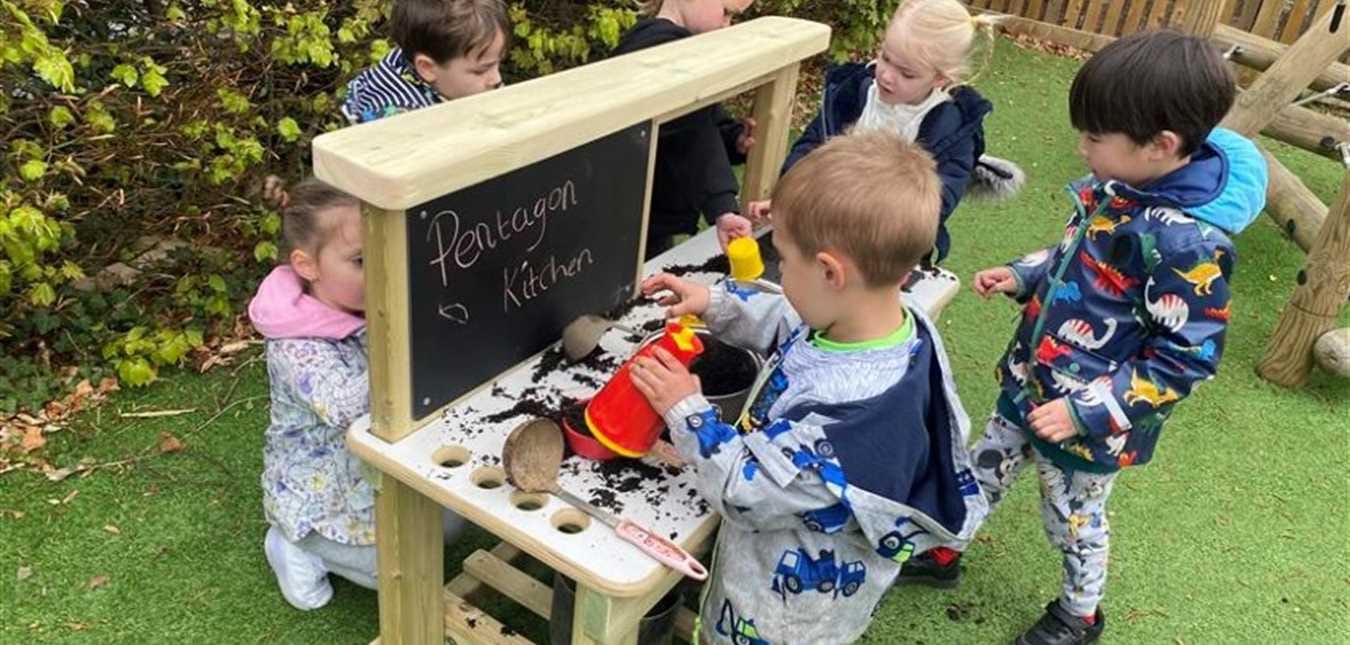
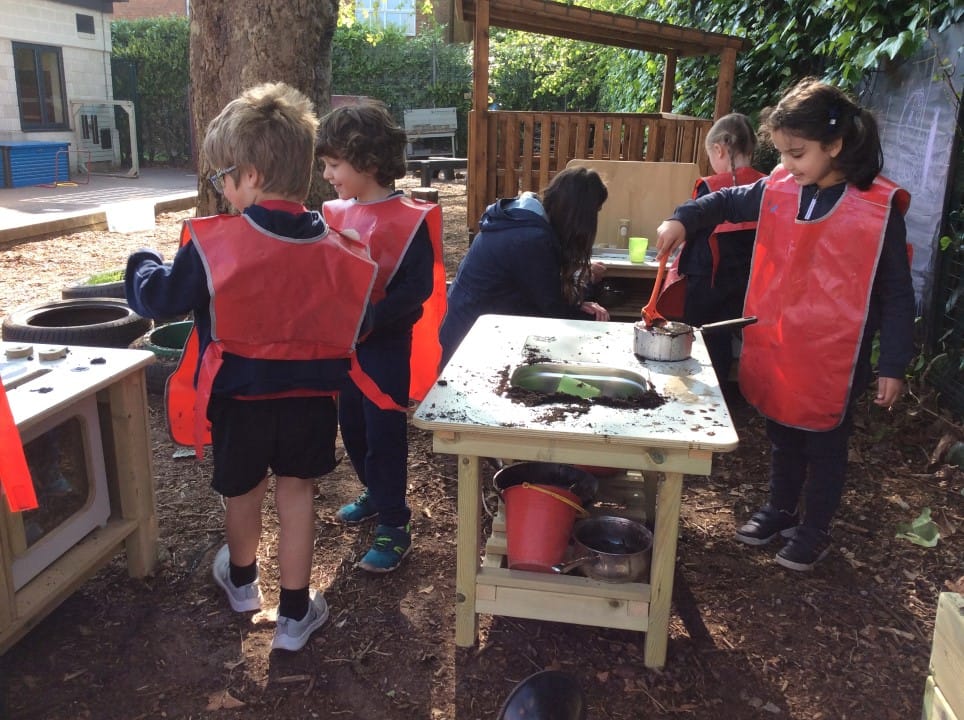
 (5)-web.png)
